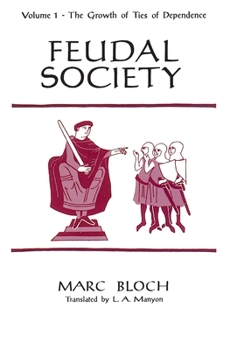Book Overview
"Few have set themselves to the formidable task of reconstructing and analyzing a whole human environment; fewer still have succeeded. Bloch dared to do this and was successful; therein lies the enduring achievement of Feudal Society."--Charles Garside, Yale Review
Format:Paperback
Language:English
ISBN:0226059782
ISBN13:9780226059785
Release Date:August 1964
Publisher:University of Chicago Press
Length:287 Pages
Weight:0.68 lbs.
Dimensions:0.7" x 5.3" x 8.0"
Related Subjects
Europe History Politics & Social Sciences Social Science Social Sciences Textbooks WorldCustomer Reviews
3 ratings
A review by a non-historian
Published by Thriftbooks.com User , 18 years ago
I read this book for a contemporary historiography class. As has been told by other reviewers, Marc Bloch is the founder (together with Lucien Febvre) of the Annales school. As a non-historian, I won't comment on its importance for historiography, but as a very valuable read for non-historians who want to understand the history of Western civilization reading the best books that have been written on the subject. This is my first book on the middle-ages and, although it took me quite a while to finish it (about a month) and it is definitively not an easy read, since it is an extraordinarily erudite work, it is a very worthwhile read. It provides a fairly good picture of how the feudal society developed after the Hungarian, Muslim, and Scandinavian invasions, which allowed it to flourish. I would point out two basic concepts that were of particular interest to me (although not explicit in the text). First, the concept of sovereignty. It is particularly interesting visually, since land was divided among an infinite number of lords as a bottom-up chain starting from the lowest peasant through the prince or monarch. So land belonged to everyone and to no one at the same time. This is a very original idea of sovereignty, rather opposite to modern sovereignty. The second concept is that of the "hommage", which I would call contract. The hommage between serf and lord was not that of subordination entirely, but it was neither that of equals--such as the contracts of the bourgoisie were, that we can trace back to the XIIth century, and personally I was moved by Bloch's analyses of this first contract among equals--, and it was originally voluntary. According to Bloch, this hommage influenced many other contracts we know of, namely marriage, courtois love, and even representative parliamentary governments. To conclude with, I would say that my historiography teacher told me this is the best work on the middle-ages, so I decided to read it, and it wasn't easy, it took me a while, but it was very rewarding. I don't recommend it for people who don't read a lot, but if you enjoy history and want to know what the feudal society was all about, this is a very rewading book as an introduction to the middle-ages. I strongly recommend it.
On the top ten list for medieval studies
Published by Thriftbooks.com User , 22 years ago
Bloch's work is one of the ten most important and influential books on medieval Europe. Bloch displays true excellence in sholarship and narration. Nothing is stated without factual documentation to support it, and no information is carried beyond its logical conclusions. It is essential to read this two volume work before moving too deeply into medieval studies. Combine this work with Strayer's Feudalism (out of print, unfortunately) and you will have a good understanding of what society was like in a good portion of the Middle Ages.
Lords of the Land: Marc Bloch's Feudalism - Masterful Work
Published by Thriftbooks.com User , 24 years ago
Marc Bloch's Feudal Society is the most informative and by far the best documented treatise one is likely to encounter among all the books and articles ever written on this subject. Bloch cogently remarked, in effect, that a land without a Lord is a land without a history, and that of course is a land without records - records which document and address not only the daily issues and encounters of classes in feudal society, but which also inform readers of the critical changes over time, in the passing of the first and second feudal age and its dissolution in the rise of capitalist social formations. Hardly a line was written without ample documentation. It is a wonderful companion to Carl Stephenson's slender volume, Mediaeval Feudalism, on feudal social and political institutions.






